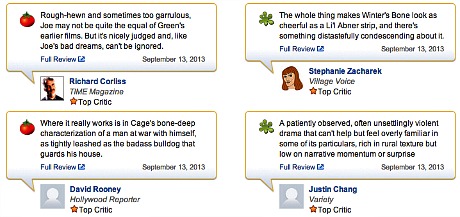
Month: January 2014
What It’s Come To
I don’t know how long it’s been de rigeur for U.S. theatres to run about 20 minutes worth of trailers and ads before a film. I seem to recall that the norm was more like 10 to 12 minutes a decade ago. I know that two and half years ago I linked to Marshall Fine‘s complaint about having been subjected to 20 minutes’ worth of ads and trailers at a New York-area AMC theatre. I reported in the same piece that I sat through 27 minutes worth of trailers and consumer ads before seeing Very Bad Trip 2 at the Pathe Wepler in Paris.
The latest assessment is contained in a just-posted Hollywood Reporter story about exhibitors caling for shorter trailers. Reporter Pamela McClintock states that “it’s not uncommon for many circuits to play seven or eight trailers before a film [which] translates to 17.5 minutes to 20 minutes, on top of in-house advertising.”
Trailers are aimed at the lowest common denominator, which is why they’re generally artless, numbing and often depressing. (Intriguing trailers pop up but very infrequently.) Run-of-the-mill trailers mainly convince you not to see a film rather than vice versa. By the time you’re sat through 20 minutes of trailer torture you’re much less open and receptive to whatever the feature may hold. And you’re paying for this. You’re paying $12 to $15 a head to be turned off and numbed out.
Tarantino On The Ropes
On top of Gawker’s spirited rebuttal to Quentin Tarantino‘s lawsuit over the Hateful Eight brouhaha (i.e., “contributory copyright infringement for linking to a site that is being sued for direct copyright infringement”), MSNBC’s Joe Scarborough — a longtime critic of Tarantino’s shovelling of ironic high-style violence in his films — stood behind the website this morning. “I don’t even understand that story,” Scarborough said. “Who’s going to sue Gawker? Let Gawker be Gawker. Leave Gawker alone.” Translation: Fuck Tarantino and the violent horse he’s been riding around on for years. He’s an irresponsible pusher of pornographic violence. Let him twist in the wind. [A clip of Scarborough trashing Tarantino after the jump.]
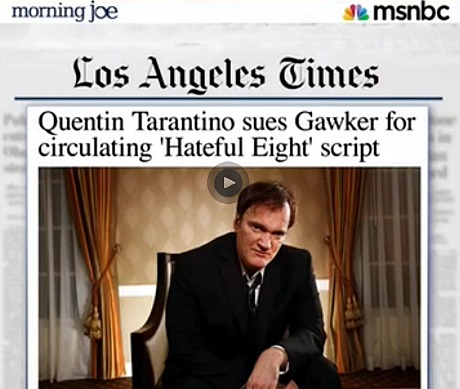
A Long and Happy Life
“I couldn’t understand the words. I wanted to hear the words. It was a great song, ‘Maggie’s Farm’, and the sound was distorted. I ran over to the guy at the controls and shouted, ‘Fix the sound so you can hear the words.’ He hollered back, ‘This is the way they want it.’ I said ‘Damn it, if I had an axe, I’d cut the cable right now.’ But I was at fault. I was the emcee, and I could have said to the part of the crowd that booed Bob, ‘You didn’t boo Howlin’ Wolf yesterday [and] he was electric!” Though I still prefer to hear Dylan acoustic, some of his electric songs are absolutely great. Electric music is the vernacular of the second half of the 20th century, to use my father’s old term.” — a backstage account of the historic “Dylan goes electric at the 1965 Newport Folk Festival” episode, as passed along 13 years ago by the late, great Pete Seeger…may he rest in peace.
Surreal Collins Moment
It happened three hours ago, or around 8 pm. I succumbed to an overpowering impulse to have a grilled cheese sandwich on rye toast. I pulled into Astro Burger (7475 Santa Monica Blvd., West Hollywood) and ordered one, and then sat at an indoor table. Four people were sitting at the table in front of me, and there was some doleful guy sitting across from me. Maybe ten seconds after I sat down Phil Collins‘ “Sussudio” started playing. (The booth tables all have those little old-fashioned ’50s-style jukeboxes.) I suspected that somebody at the four-person table had played it because — get this — a bearded, somewhat overweight, dark-complexioned guy at this table started singing along with Phil while the other three just sat and listened. They were staring down at the table top, for the most part. Expressing nothing. Motionless. One of them, a woman, was very faintly grinning.
The portly singer wasn’t putting a lot of effort into it. He was singing like he was alone in his car, using Phil’s exact phrasing…”Soo-soo-sudio.” I could roll with four people singing along but one guy…? The three friends were so…I don’t know, impressed by this guy’s shitty imitation of Phil Collins that they decided to just…what, listen and absorb? By this point my face was starting to contort into one of my trademark scowls…one of my “what the fuck is going on here?” expressions. Who sings along to a Phil Collins pop song while his tablemates just sit there and listen like penguins, slightly nodding or half-grinning or just appreciating the performance? I forgot about the grilled-cheese sandwich. I’d forgotten why I was there. I stole a quick look at the doleful guy across the aisle and he was also staring at this quartet and making a slight face (or so it seemed from the corner of my eye). Who are these people? And then the song finally ended.
Wolf Bluray To Contain Skankier 4-Hour Version?
The Daily Mail‘s James Desborough is reporting that the Bluray/DVD of Martin Scorsese‘s The Wolf of Wall Street will deliver a four-hour cut that will be a bit raunchier and more eff-bomby than the theatrical release version. The plan comes from statements made by WoWS producers Joey McFarland and Riza Aziz at Saturday night’s Director Guild of America awards. I’ve asked Paramount reps to confirm — awaiting reply.

I’m Not What I Appear To Be
I didn’t want to see Greg Whiteley‘s Mitt at Sundance because I didn’t want to see a softball portrayal of a guy I’ve always regarded as one of the most clueless assholes of all time. But a Romney quote, posted by New Yorker columnist Ian Crouch, has changed my mind. “I have looked, by the way, at what happens to anybody in this country who loses as the nominee of their party,” Romney reportedly says. “They become a loser for life, all right? That’s it. It’s over.” That’s right! This is probably the most candid and appealing comment from Romney ever. I’m now feeling a certain limited respect for the guy. I’m watching Mitt on Netflix tonight. (Romney also says that “Mike Dukakis can’t get a job mowing lawns.”)
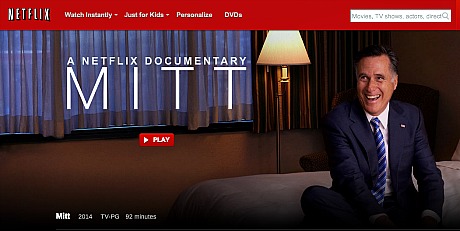
Update: Salon‘s Blake Zeff watched it, disliked the lack of political candor, regarded the “focus on the family” material as a dodge.
Lost, Gone, Blown
“And they lived happily ever after” finales in romantic films never work. They never stick to your ribs. If they seem to half-deliver they certainly don’t last in the memory. The best endings, as Sydney Pollack pointed out time and again, are ones in which it hasn’t worked out and the lead protagonists realize it’s gone for good. Final, irreparable. My three favorites are the finales of Ang Lee‘s Brokeback Mountain, Hal Ashby‘s Shampoo and Pollack’s The Way We Were. What are some of the others? Remember — we’re talking about a feeling of absolute romantic failure and loss. Death can’t be a factor — the lovers have to realize and accept that it’s their fault.
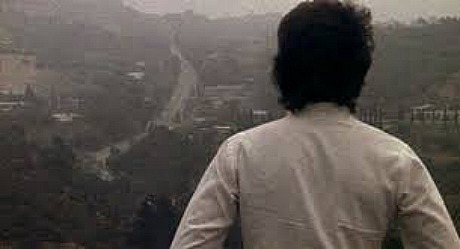
Warren Beatty’s George Roundy watching the love of his life, Julie Christie’s Jackie Shaw, drive off to Acapulco with Jack Warden’s Lester Karp in Shampoo (’75).
Say It Plainly
The best quote in Tom Teodorczuk‘s 1.26 Independent piece about Oscar campaigning is from The Hollywood Reporter‘s Scott Feinberg, to wit: “The deep, dark secret is that a lot of Academy members don’t watch a lot of the movies. To get them to watch the movies is the biggest challenge.” This can’t be repeated enough — whatever respect and credibility the Academy has among the cognoscenti is constantly being undermined by the deadwoods, who are generally older and sleepier and who tend to think and vote more conservatively.
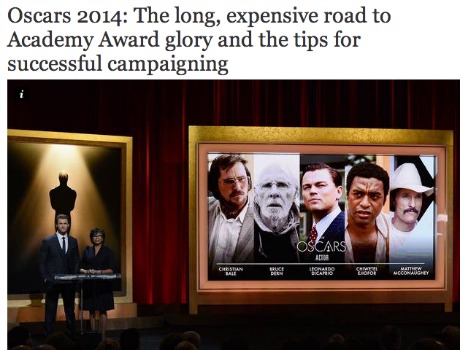
Brush It Aside
I’ve never paid the slightest attention to the Best Song category. Even when I was ten I thought it was inane. That aside, I presume that “Let It Go,” the tune from Frozen, is going to win. Not that anyone except for the composers, performers and their families give a shit. “Alone Yet Not Alone” sounds inelegant. “Happy,” the Despicable Me 2 song, sounds sappy. I don’t even remember “The Moon Song” from Her or “Ordinary Love” from Mandela: Long Walk to Freedom.
Once Captured
Once a respected big-time actor has been well imitated, a certain mystique falls away. They shift into meta mode. Their screen manner or personality becomes a reflection of the imitators and vice versa and into infinity — a hall of mirrors. One of the first actors to experience this was James Cagney with every other nightclub comedian doing him in the ’50s and ’60s. (“Cagney” went full meta in One, Two, Three when (a) Red Buttons did him and (b) he parodied his own Public Enemy grapefruit scene.) When Rob Brydon and Steve Coogan did Michael Caine in The Trip, something snapped — I’ve never been able to believe in Caine’s older-guy performances since (particularly his Batman appearances). This guy’s Matthew McConaughey drawl isn’t perfect but it’s pretty good. And with this, the Real McCoy’s Dallas Buyer’s Club performance has been simultaneously mythologized and taken down a notch.
Dullest Then-and-Now Location Doc Of All Time
One of the promotions for Criterion’s recently released Bluray of Stanley Kramer‘s It’s a Mad, Mad, Mad, Mad World (’63) is a then-and-now location reel. Shot and assembled by George Ann Muller and Paul Scrabo, it conveys how numerous desert locations haven’t changed much over the last 50 years, and how the areas around some commercial outpost locations (remote gas stations, etc.) have been developed and are now greener. The descriptive term, no offense, is “underwhelming.” Which isn’t to say location pieces can’t be interesting. You just have to choose films that weren’t largely shot in the desert. Downer: The “big W” (i.e., the crossed palm trees over the buried loot) has been cut down.
